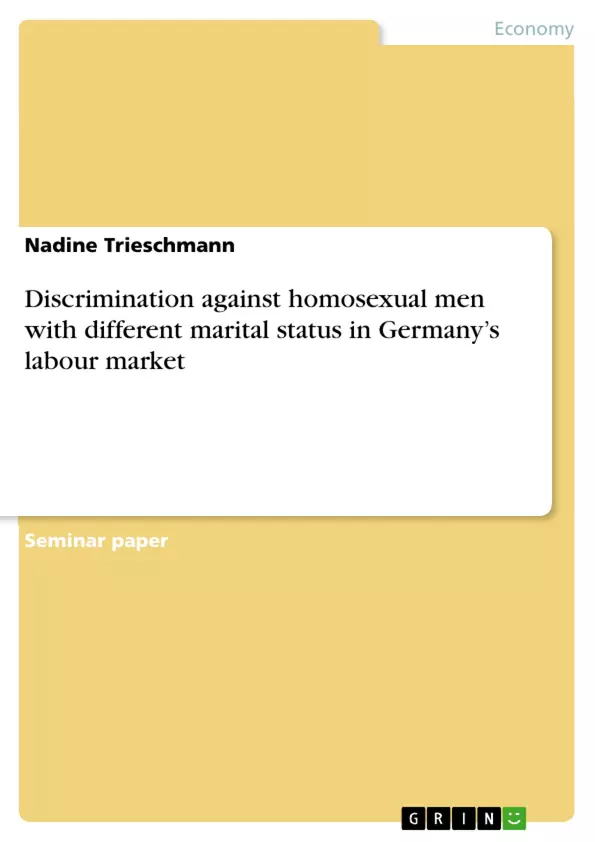The research question is if homosexual married men are favoured in the hiring process over homosexual single men in the German labour market, and secondly if this "marriage-effect" is stronger for homosexual men than for heterosexual men. To be able to answer this question, a Correspondence Test has to be conducted. Four fictional applications of males who vary in their sexual orientation (heterosexual versus homosexual) and marital status (married versus single) will be sent to vacancies in the sixteen German provincial capitals and sixteen rural regions in Germany.
Since the first of October 2017, same-sex couples in Germany have the right to marry. Until this point in time, homosexual couples could only enter into a registered partnership with the same duties, but not the same rights as heterosexual married couples. This significant development in law may introduce new problems and challenges. Ann Ferguson (2007), for one, criticises that homosexual marriage could shift social hierarchies, which in return creates a new differentiation between homosexual people who live in a single household and the more socially accepted married homosexual couples. Butler (2004) argued that homosexual marriage could be understood as a way to push homosexuals into a normalized lifestyle – for example, marriage, a monogamous family life, and also successful careers, which could increase social acceptance.
In this sense, this paper is building on the work by Weichselbaumer (2013) who examined the difference in economic outcome between single lesbians and lesbians in a registered partnership in Munich and Berlin. She found no differences between single and partnered lesbians in Munich – both groups are treated unfavourably in comparison to heterosexual women. In Berlin, she found out that there is no discrimination based on sexual orientation. But some studies showed that negative attitudes towards homosexual men are more present than towards lesbians and that employers may have preferences for male employees with one steady married partner. If this is the case, homosexual men may benefit more from signalling that they live in a marriage than lesbian women would. Therefore, this paper sets forth the study of Weichselbaumer (2013) by focusing on homosexual men instead of lesbians, and on the other hand, by measuring the effect after the legislation of same-sex marriage in Germany.
Inhaltsverzeichnis (Table of Contents)
- INTRODUCTION
- THEORETICAL BACKGROUND
- DIFFERENCES IN EARNINGS
- EXPERIMENTS ON DISCRIMINATION AGAINST HOMOSEXUAL MEN AND LESBIANS
- METHOD
- HYPOTHESIS
- CITIES
- OCCUPATIONS
- APPLICATION DOCUMENTS
- PROCEDURE
- EVALUATION OF THE RESULTS
- CONCLUSION
Zielsetzung und Themenschwerpunkte (Objectives and Key Themes)
This paper aims to examine the impact of same-sex marriage on the hiring process for homosexual men in Germany. Specifically, it investigates whether homosexual men who are married are favoured over single homosexual men in the German labour market. Additionally, the study aims to determine whether this "marriage-effect" is stronger for homosexual men than for heterosexual men. This research builds upon previous work by Weichselbaumer (2013) who explored the differences in economic outcomes between single and partnered lesbians in Munich and Berlin.
- Discrimination against homosexual men in the German labour market
- The impact of same-sex marriage on hiring practices
- Comparison of the "marriage-effect" between homosexual and heterosexual men
- Correspondence test methodology to assess discrimination
- Exploring the potential benefits of signaling marital status for homosexual men
Zusammenfassung der Kapitel (Chapter Summaries)
- Introduction: This chapter introduces the research topic, highlighting the legal changes in Germany regarding same-sex marriage and its potential implications. It discusses relevant existing studies on discrimination against homosexual individuals and emphasizes the importance of investigating the "marriage-effect" for homosexual men in the German labour market.
- Theoretical Background: This section delves into the theoretical framework of discrimination, defining different forms such as statistical, preference-based, and implicit discrimination. It reviews existing literature on earnings differences between homosexual and heterosexual individuals, analyzing the potential for discrimination in the hiring process based on sexual orientation and marital status.
- Method: This chapter outlines the research methodology employed in the study, including the research question, hypotheses, and the design of the Correspondence Test. It details the specific cities and occupations targeted for the test, the characteristics of the application documents, and the procedure for sending and evaluating the applications.
Schlüsselwörter (Keywords)
This paper focuses on the key themes of discrimination, same-sex marriage, the German labor market, correspondence test methodology, and the "marriage-effect". It also examines the potential for statistical, preference-based, and implicit discrimination against homosexual men in the hiring process.
Frequently Asked Questions
Is there a "marriage effect" for gay men in the labor market?
The research investigates if being married signals a "normalized" lifestyle that might reduce discrimination against homosexual men during the hiring process.
What is a Correspondence Test in discrimination research?
It involves sending identical fictional applications to job vacancies, only varying one characteristic (like marital status or sexual orientation) to measure hiring bias.
When did same-sex marriage become legal in Germany?
Same-sex couples have had the right to marry in Germany since October 1, 2017.
How does discrimination differ between gay men and lesbians?
Studies suggest that negative attitudes are often more prevalent towards homosexual men than lesbians, making the "marriage signal" potentially more significant for men.
What are statistical and preference-based discrimination?
Statistical discrimination is based on group averages (e.g., productivity assumptions), while preference-based discrimination stems from personal biases of the employer.
- Quote paper
- Nadine Trieschmann (Author), 2018, Discrimination against homosexual men with different marital status in Germany’s labour market, Munich, GRIN Verlag, https://www.grin.com/document/906341



